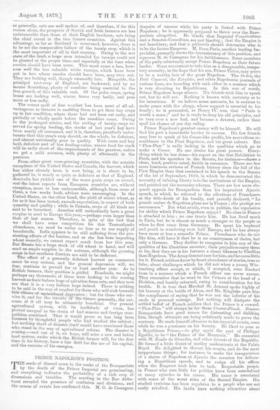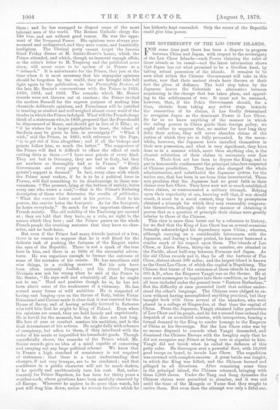PRINCE NAPOLEON'S POSITION.
E seeds of discord sown in the ranks of the Bonapartists I by the death of the Prince Imperial are germinating, and everything indicates the probability of a rich crop of dissensions and troubles. The meeting in the Rue Abba- tucei revealed the presence of confusion and divisions, and the course of events has confirmed this. M. G. de Cassagnac despairs of success while his party is linked with Prince Napoleon ; he is apparently prepared to throw over the Bone- partists altogether. He thinks that Imperial Constitutions
and a Senatus-Consultum are not binding ; that the Empire is not hereditary, and that a plaiseite should determine who is
to be the future Emperor. M. Prax-Paris, another leading Im- perialist, promptly shows the inconsistency of this position, and reproves M. de Cassagnac for his faithlessness. Some members of the party reluctantly accept Prince Napoleon as their future leader. Some are content to take him as a disagreeable, tempo- rary necessity, in the hope that his son, Prince Victor, may prove
to be a worthy heir of the great Napoleon. The Ordre, the Petit Caporal, the Estalette, and other Napoleonic journals of various hues, are brawling with each other in a manner which
is very diverting to Republicans. In this war of words, Prince Napoleon keeps silence. His friends wish him to speak out, but he will not. Nothing is known with certainty as to his intentions. If we believe some accounts, he is anxious to make peace with the clergy, whose support is essential to his family ; he is persuaded, as Henry IV. was, that "Paris is worth a mass ;" and he is ready to deny his old principles, and to turn over a new leaf, and become a devotee, rather than spoil his chance of one day ruling.
Prince Napoleon's greatest enemy will be himself. He will find his past a formidable barrier to success. His few friends may love to speak of his Cessar-like profile, his marvellous re- semblance to the First Napoleon, and his great talents. But " Plon-Plon " is sadly lacking in the qualities which go to make a Cresar. No one denies his great powers. Every- thing which he has done—his report on the first Exhibition in Paris, and his speeches in the Senate, for instance—shows a clear, hard, positive mind, fertile in resources. There are few more luminous reviews of French history since the fall of the First Empire than that contained in his speech to the Senate of the 1st of September, 1869, in which he demonstrated the necessity of infusing liberty into the institutions of the Empire, and pointed out the necessary reforms. There are few more elo- quent appeals for Bonapartism than his imprudent Ajetcio speech, in which he referred to the affections of Frenchmen as the title-deeds of his family, and proudly declared, "La grand° ombre do Napoleon plane sur la France ; elle protege ses successeurs." But what avails, even in politics, the reputation for ability which Prince Napoleon enjoys? No class in France is attached to him ; no one trusts him, He has lived much in Paris, but he is almost as much a stranger to the people as when he first came from Germany. He spent his boyhood and youth in wandering over half Europe, and he has always been more or less a nomadic Prince. Frenchmen who do not like him, will have it that he is no countryman of theirs, but only a German. They decline to recognise in him any of the qualities of his illustrious ancestor; their prejudices carry them so far, that they see in his features a closer likeness to Vitellius than Napoleon. The Army does not care for him, and he cares little for it. French soldiers know by heart abundance of stories, true or false, about challenges which lie did not when a young Wiir- temberg officer accept, or which, if accepted, were flinched from in a manner which a French officer can never excuse. They remember that he went to the Crimea at the head of a Division, and hastily returned, owing to consideration for his health. It is true that Marshal St. Arnaud spoke highly of his bravery at the battle of Alma, and Mr. Kinglake pays him the compliment of saying that he was not the inferior of his uncle in personal courage. But nothing will dissipate the settled belief of French soldiers that the Prince is a coward. " Plon-Plon " will always be for them Craint-Pkeib, Sincere Bonapartists have good reason for distrusting and disliking Min, though attempts are being sedulously made to prove the contrary. He made himself offensive to his imperial cousin, even
while he was a pensioner on his bounty. He liked to pose as a Republican Prince,—to play again the part of Philippe Egalite, to be "the Prince of the Mountain." He consorted with M. Emile de Girardin, and other friends of the Republic. He formed a little Court of motley malcontents at the Palais Royal. He delighted to thwart his cousin, and do the most inopportune things ; for instance, to make the inauguration of a statue of Napoleon at Ajaccio the occasion for deliver- ing a Republican speech, and to resign all his offices when the Emperor took him to task. Respectable people in France who care little for politics have been scandalised at many episodes in his career. His name is associated with some of the worst sides of the Second Empire. His studied cynicism has been repulsive to a people who are not easily revolted. His faults have nothing attractive about
them ; and he has managed to disgust some of the most tolerant men of the world. The Roman Catholic clergy dis- like lanss and not without good reason. He was the oppo- nent of the Temporal Power. His opinions were always pro- nounced and undisguised, and they were coarse, and fanatically irreligious. The Oleripal party cannot forget the famous Good Friday dinner at M. Sainte-Beuve's house, which the Prince attended, and which, though an innocent enough affair, as the critic's letter to M. Troplong and the published menu show, will never cease to be spoken of in France as a "debauch:" It is unfortunate for the Prince, that just at the time when it is most necessary that his unpopular opinions should be forgotten by the world, they are brought into full light again by the publication, in the Fortnightly Review, of the late Mr. Senior's conversations with the Prince in 1859, 1860, 1861, and 1862. The remarks which Mr. Senior records were not thrown out at random ; the Prince invited the modern Boswell for the express purpose of making him chronicle deliberate opinions, and Frenchmen will be justified in treating as studied and well weighed almost every word of the tirades in which the Prince indulged. What will the French clergy think of a statesman who,in iC 860, proposed that the Pope should be dispossessed of Rome, and should get in lieu of it Elba ; or, "if he wishes for a larger population to tease, the island of Sardinia may be given to him in sovereignty ?" "What I wish," said the Prince, in 1861, with reference to the Pope, 44 is to get rid of him altogether ; and if all the bishops and priests follow him, so much the better." The supporters of the Prince will find it difficult to efface the effect of such cutting dicta as these :–■." I have seen priests of every kind. They are bad in Germany, they are bad in Italy, but they are nowhere so thoroughly bad as in France." "Every Government and every party that relies on their (the priests') support is doomed." In fact, every class with which the Prince must reckon, if he is to be a political force in France, will find something to its disadvantage in these con- versations. ,44 The peasant, lying at the bottom of society, hates every one who wears a coat,"—that is the Piince's flattering description of those who determine the results of plebiscites. " What the ouviier hates most is his patron. Next to his patron, the ouvrier hates the bourgeois. As for the bourgeois, he hates everybody." So much for two important classes of French society. The old nobility of the Faubourg are sneered at ; they are told that they have, as a rule, no right to the names which they bear ; and the Prince passes on the whole French people the crushing sentence that they have no char- acter, and no back-bone.
But even if the Prince had many friends instead of a few, there is no reason to suppose that he is well fitted for the delicate task of pushing the fortunes of the Empire under the eyes of the Republic. There is not a spark of the true hero in him, and there is as little of the successful adven- turer. He was sagacious enough to foresee the outcome of some of the mistakes of his cousin. He has sometimes said wise things, in a striking manner. But his acts have been often curiously foolish ; and his friend Prosper 111(;rimde was not far wrong when he said of the Prince to Mr. Senior, "He says well and admirably all that he ought not to say." Hard and positive though he is, he has not been above some of the weaknesses of a visionary. He has nursed many forms of wild ambition. He is suspected of having cast longing oyes on the throne of Italy, before Victor Emmanuel and Cavour made it clear that it was reserved for the House of Savoy, and of having actually listened to flatterers who told him that he might be King of Poland. Even when his opinions are sound, they are held loosely and capriciously. He is fervid for the moment, but the fit does not last long. His love of ease or comfort masters his ambition, and is the final determinant of his actions. He might daily with schemes of conspiracy, but adieu to them, if they interfered with the .order of his meals or imperilled his household goods. Though superficially clever, the remarks of the Prince which Mr. Senior records give no idea of a mind capable of conceiving and carrying out any largo political scheme. We know that in France a high standard of oonsistency is not required of statesmen ; that there is a tacit understanding that changes, if not very brusque, are to be condoned ; and that confidence in a public character will not be much shaken, if he quietly and unobtrusively turn his coat. But, unfor- tunately for Prince Napoleon, he has been for thirty years a weather-cock, whose gyrations have been carefully observed by all Europe. Whenever he aspires to do more than watch, his past will drag him down, unless he reveals faculties which he
has hitherto kept concealed. Only the errors of the Republic could give him power.



































 Previous page
Previous page